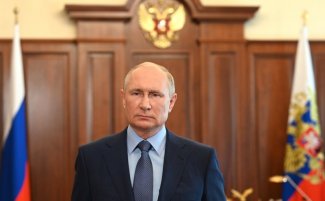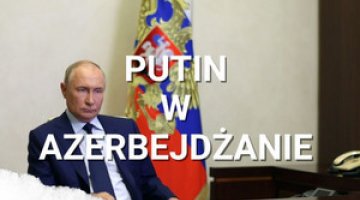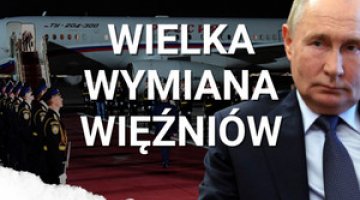Putin’s article: ‘On the historical unity of Russians and Ukrainians’

12 July 2021 saw the publication of an article by President Vladimir Putin, entitled ‘On the historical unity of Russians and Ukrainians’, which had been announced on 30 June 2021 during the President’s Direct Line public conference with citizens. The text was published on the President’s official website kremlin.ru (in two languages: Russian and Ukrainian).
The content of the article, which focuses on analysing the history of Russian-Ukrainian relations, is dominated by the claim that Ukrainians are an ancient, inseparable part of the ‘triune Russian nation’. This community is based on a common history spanning one thousand years, the language, the ‘Russian’ ethnic identity, the shared cultural sphere and the Orthodox religion. Their bond with the Russian state is special and organic; it guarantees Ukraine’s development, and any attempts to sever or weaken this bond (which could only be inspired by external actors) will inevitably result in the collapse of Ukrainian statehood.
The most important points regarding the history of bilateral relations include the following:
- There are no historical arguments to justify the claim that a separate Ukrainian nation existed prior to the Soviet period: the proclamation of the Ukrainian nation was merely the result of the Austro-Hungarian Empire pursuing its great-power interests. Following World War I, having severed its bond with Russia, the Ukrainian state was short-lived, which resulted from “ceding full control of Ukraine to external forces” (first Germany, then Poland); all those who have recently surrendered control of the country to “external forces” should remember this. The Malorussian and Ukrainian culture flourished due to the policy pursued by the Russian Empire and then the Soviet Empire (in relation to the latter, Putin mentions the policy of korenizatsiya, and mistakenly claims that it was continued into the 1930s); it was only Soviet national policy that created a basis for distinguishing between the three separate nations – Russian, Belarusian and Ukrainian.
- Russia views the existence of the Ukrainian nation “with respect”. However, present-day Ukraine owes its territorial form to the Soviet period. It benefitted from “regaining” ancient Russian lands at the expense of Poland, Romania and Czechoslovakia, and obtained territories which had been taken away from “historical Russia”. Consequently, if Ukraine is determined to severe its friendly relations with Russia, i.e. the USSR’s heir, it should return to its 1922 borders. Putin also took the opportunity to criticise the policy pursued by the Bolsheviks; he accused them of “robbing” Russia of the territories that were awarded to Ukraine.
- Russia did a great deal to help the Ukrainian state thrive post-1991; Putin mentioned the significant economic assistance Russia offered to Kyiv. The rupture of the ties between the two countries has resulted in Ukraine’s economic degradation: at present Ukraine is “Europe’s poorest country”. The anti-Russian Ukrainian authorities have “wasted and frittered away the achievements of many generations”, even while the two nations still have “great affection” for each other.
- Putin also offered harsh criticism of the policies pursued by the authorities in Kyiv, both towards Russia and domestically, and of the local oligarchs who plunder the Ukrainian state. Ukraine is affected by a persistent weakness of its state institutions and has become “a willing hostage to someone else’s geopolitical will”. In addition, Putin accused Kyiv of mythologising and rewriting history – a routine allegation against those neighbouring states which work to debunk Russian historical propaganda. In Putin’s words, “the common tragedy of collectivisation” back in the 1930s is falsely presented as a genocide of the Ukrainian people. As he pointed out, the Ukrainian elites wrongfully base the country’s independence on a denial of its past. However, at the same time they “conveniently” leave out the aforementioned issue of the contemporary state’s borders.
- Putin once again criticised the Kyiv government’s language policy and the law on indigenous peoples of Ukraine. According to his interpretation, “forced assimilation” of ethnic Russians is ongoing and an ethnically pure Ukrainian state, aggressive towards Russia, is being formed. The consequences of this approach are comparable to “the use of weapons of mass destruction” (sic!) against Russia. In addition, he criticised the autocephaly of the Ukrainian Orthodox Church, seeing this as a blow to the spiritual unity of the two nations and a result of the secular authorities’ blatant interference in church life.
- According to Putin, the West intends to transform Ukraine into an “anti-Russia”, an anti-Russian “springboard”, a barrier between Russia and Europe. This echoes plans devised in the past by “Polish-Austrian ideologists” who intended to create “an anti-Moscow Rus”. This runs counter to the interests of the Ukrainian nation, which was exploited by Poland, Austria-Hungary and Nazi Germany in the past, and “cynically used” again in 2014. The “anti-Russia” project cultivates the image of an internal and external enemy, is leading to the militarisation of Ukraine (including the expansion of NATO’s infrastructure on its territory) and views it as a protectorate of the Western powers. This project thus denies Ukraine’s genuine sovereignty. The “millions of people” who reject this “anti-Russia” plan are viewed as Moscow’s agents, persecuted or even killed. Only those who hate Russia are considered “the right kind of patriots”. This means that Ukrainian statehood is being built on hate, and this is a very shaky foundation for sovereignty, burdened with a tremendous risk.
- Putin reiterated some of his previously voiced arguments regarding the causes of Ukraine’s destabilisation post-2014. The “anti-Russia” project has been rejected by millions of Ukrainians: Crimea has made its “historic choice”, and the population of the Donbas took up arms to prevent ethnic cleansing. He warned that “the followers of Bandera did not abandon their plans to crack down on Crimea, Donetsk and Lugansk” and their crimes would be comparable to those perpetrated by the Nazis. As he said, “They are biding their time. But their time will not come”. Putin also claimed that “Kyiv simply does not need Donbas” because the local population will never accept the rules of the game imposed by the central government, and the implementation of the Minsk agreements would contradict the “anti-Russia” project. Ukrainian president Volodymyr Zelensky “lied” when he claimed ahead of the presidential election that he would strive to achieve a peaceful solution to the Donbas problem; instead, the situation has deteriorated further since then.
- Moscow will never allow its “historical territories” and the people living there to be used against Russia. Those who undertake such an attempt will destroy their own country. Meanwhile, good-neighbourly cooperation is possible and desired; ideally it should be modelled on German-Austrian and American-Canadian relations, in which ethnically similar states that speak the same language are closely integrated while remaining sovereign.
- In the text, Poland is presented as an empire competing with Russia, albeit a weaker one. Its policy towards Ukraine has always been based on the forced Polonisation and Catholicisation of the local population. Meanwhile, the incorporation of a portion of Ukraine into Russia in the 17th century was an act of democratic will on both sides. The further annexations of Polish lands (in the 18th century and later) are (as usual) presented as the process of Old Russian lands being regained and reunited.
Commentary
- The article is another example of Putin’s revanchism. Although the anti-Ukrainian arguments presented in the text are not new, their more detailed form and appeals to a historical legacy are intended to reinforce and justify the Kremlin’s message: Russia will not abandon its attempts to keep Ukraine within its sphere of influence. The text contains a de facto threat that the 1991 Belovezha Accords (which recognised the inviolability of borders between the former Soviet republics) may be considered invalid should Ukraine fail to yield to Russia. Due to the present international situation, this threat should be viewed as an empty, ostentatious gesture confirming the increasingly ritual nature of Russian propaganda. However, it is evident that the Russian authorities are toughening up their narrative. On the one hand, this may suggest that the Kremlin feels frustrated with its limited impact on Ukrainian politics, and on the other, that plans have been made to step up the destabilisation of Ukraine in the coming months.
- Putin’s article reflects his attachment to Russia’s imperial history and its ‘history-making’ destiny to determine the fate of the Ukrainian and Belarusian peoples. He reiterates, in an oversimplified manner, the basic assumptions of 19th-century official historiography of the Russian Empire. He also refers to conspiracy theories formulated by Russian far-right groups, claiming that the Ukrainian nation was a Polish (and later an Austro-Hungarian) anti-Russian political project. In order to prove his main argument, Putin passes over events which are inconvenient for Russia and presents many others in a biased or blatantly distorted manner. This falsified ‘common history’ is intended to legitimate Russia’s influence on Ukrainian society, in order to correct the mistakes made by the ‘puppet’ government in Kyiv.
- The clear threats aimed at Kyiv (suggesting that its anti-Russian policy is exposing Ukraine to the risk of losing its statehood) are mainly formulated with the Western audience in mind. This is being done in the context of the upcoming elections in Germany (in this sense, the text is a continuation of the conciliatory article Putin published on the anniversary of Nazi Germany’s aggression on 22 June) and Russia’s present relationship with the United States. One of Putin’s (rather unrealistic) goals is to discourage the new German government and the Biden administration from supporting the ‘hopeless’ case of defending Ukraine’s territorial integrity. This refers to the West’s position on the annexation of Crimea, military cooperation with Ukraine, and backing Ukraine’s aspirations to NATO membership. Putin sends a clear message to Western ‘hawks’ that Russia is determined to defend its interests in Ukraine – even at the expense of destroying Ukrainian statehood (or trimming its territory to a rump state). On the other hand, pro-Russian groups in the Western establishment were offered a conciliatory argument, which accompanied the blackmail: Ukrainian-Russian relations can be built on similar foundations as those of Germany & Austria and Canada & the US.
- Putin also targeted his message to Ukraine’s leadership and society. The article contains accusations that Zelensky and his team are serving foreign governments. It depicts a bright vision of the prosperity that could result from Ukraine’s integration with Russia, and condemns Ukrainian oligarchs for robbing the country. Accompanying threats to further destabilise Ukraine, should it continue its course of Euro-Atlantic integration, include a thinly-veiled warning that Moscow may resort to military measures. In the Kremlin’s logic, emphasising the ‘civilisational’ role of Orthodox Russia is intended to polarise and radicalise social groups in Ukraine by exploiting divisions about Ukrainian-Russian (Soviet) relations in the past. However, we should not expect this article to shift the views held by most Ukrainians, who now consider Russia as an unfriendly or hostile state. Attempts to undermine the feeling of national distinctiveness will likely be considered as manifestations of the Kremlin’s aggressive policy.
- Putin’s text is intended to demonstrate to Russian society that the Kremlin is determined to defend Russia’s national interests. Against the backdrop of social discontent over the increasing economic problems Russian society is facing, references to imperial resentments, the anti-Western mood and the image of the state as a ‘besieged fortress’ are all elements of the same strategic project. It boils down to building the regime’s legitimacy on its great-power legacy and bygone imperial splendour. In addition, the article contains guidelines for Russian officials regarding the desirable political narrative. One should therefore expect this discourse within Russia’s ruling elite to intensify.




